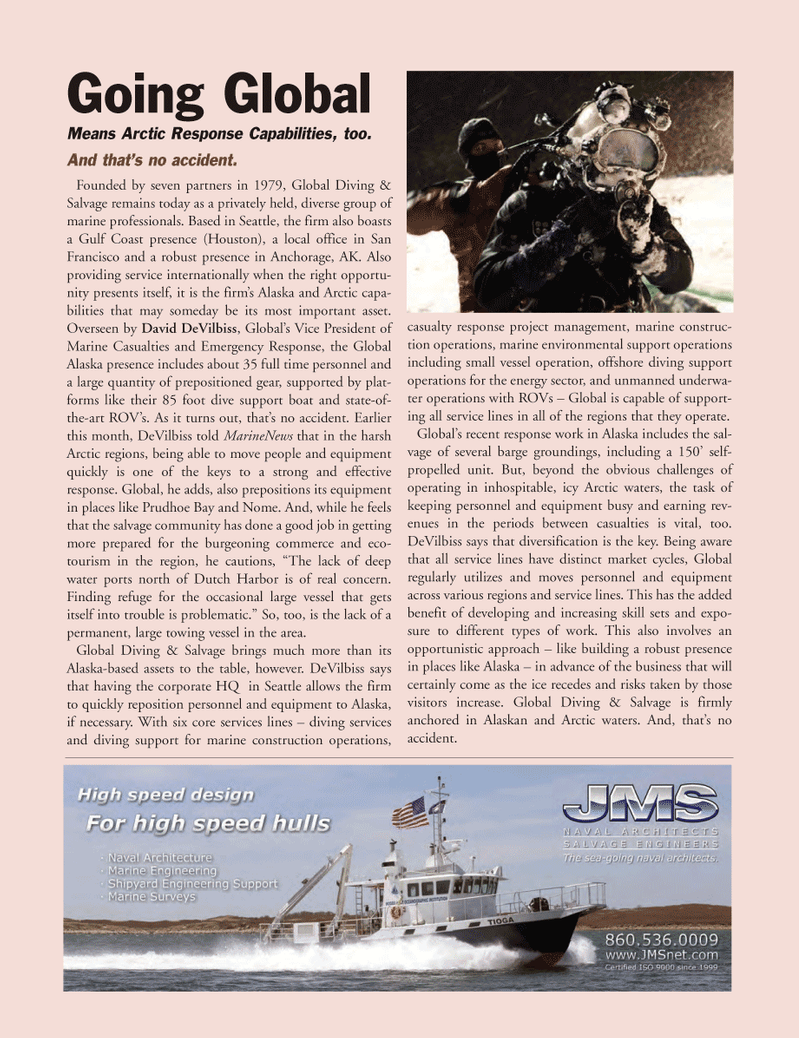
Page 27: of Marine News Magazine (February 2012)
Inland Bulk Transportation
Read this page in Pdf, Flash or Html5 edition of February 2012 Marine News Magazine
Founded by seven partners in 1979, Global Diving & Salvage remains today as a privately held, diverse group of marine professionals. Based in Seattle, the firm also boasts a Gulf Coast presence (Houston), a local office in San Francisco and a robust presence in Anchorage, AK. Also providing service internationally when the right opportu- nity presents itself, it is the firm?s Alaska and Arctic capa- bilities that may someday be its most important asset. Overseen by David DeVilbiss , Global?s Vice President of Marine Casualties and Emergency Response, the Global Alaska presence includes about 35 full time personnel and a large quantity of prepositioned gear, supported by plat- forms like their 85 foot dive support boat and state-of- the-art ROV?s. As it turns out, that?s no accident. Earlier this month, DeVilbiss told MarineNews that in the harshArctic regions, being able to move people and equipment quickly is one of the keys to a strong and effective response. Global, he adds, also prepositions its equipment in places like Prudhoe Bay and Nome. And, while he feels that the salvage community has done a good job in getting more prepared for the burgeoning commerce and eco- tourism in the region, he cautions, ?The lack of deep water ports north of Dutch Harbor is of real concern. Finding refuge for the occasional large vessel that gets itself into trouble is problematic.? So, too, is the lack of a permanent, large towing vessel in the area. Global Diving & Salvage brings much more than its Alaska-based assets to the table, however. DeVilbiss says that having the corporate HQ in Seattle allows the firm to quickly reposition personnel and equipment to Alaska, if necessary. With six core services lines ? diving services and diving support for marine construction operations, casualty response project management, marine construc- tion operations, marine environmental support operations including small vessel operation, offshore diving support operations for the energy sector, and unmanned underwa- ter operations with ROVs ? Global is capable of support- ing all service lines in all of the regions that they operate. Global?s recent response work in Alaska includes the sal- vage of several barge groundings, including a 150? self- propelled unit. But, beyond the obvious challenges of operating in inhospitable, icy Arctic waters, the task of keeping personnel and equipment busy and earning rev- enues in the periods between casualties is vital, too. DeVilbiss says that diversification is the key. Being aware that all service lines have distinct market cycles, Global regularly utilizes and moves personnel and equipment across various regions and service lines. This has the added benefit of developing and increasing skill sets and expo- sure to different types of work. This also involves an opportunistic approach ? like building a robust presence in places like Alaska ? in advance of the business that will certainly come as the ice recedes and risks taken by those visitors increase. Global Diving & Salvage is firmly anchored in Alaskan and Arctic waters. And, that?s no accident.Going Global Means Arctic Response Capabilities, too.And that?s no accident.MN#2 (18-31):MN 2011 Layouts 2/3/2012 1:45 PM Page 27

 26
26

 28
28
